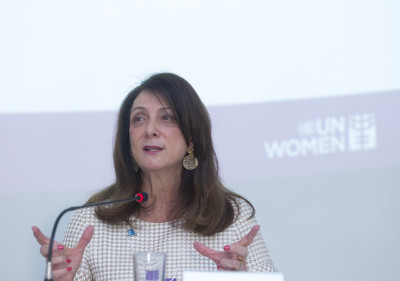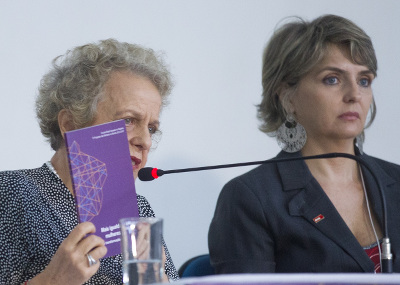Brazilian women are the major beneficiaries of social programs, highlights UN Women and Brazil’s governments’ new publication
Date:
- The publication More equality for Brazilian women: pathways for social and economic transformation, created by UN Women Brazil and the Ministry for Social Development and Hunger Fighting and the Women’s, Racial Justice, Youth and Human Rights Ministry is presented
- The publication highlights the increase in the formalization of labor rights for Brazilian women through formal contracts and the real increase in minimum salary by 76.5%.
- In the last 30 years, Brazil’s labor market has grown for women from 26% to 44%
For further information: http://www.onumulheres.org.br/wp-content/uploads/2016/05/encarte-Mais-igualdade-para-as-mulheres-brasileiras_site.pdf
Brasilia, 9 May, 2016.- The publication More equality for Brazilian women: pathways for social and economic change, based on the global Women’s World Progress 2015-2016: Transforming the economies for the realization of rights UN Women’s report places women at the center of inclusive social policy evaluation and takes a stand against gender, race and ethnic inequalities.
The publication reviews the Brazilian government’s strategy to positively impact on the lives of women through initiatives such as the Bolsa Familia, Brazil Without Extreme Poverty, the National Documentation Program, My House, My Life, Brasil Cariñoso, Light for All, Social Assistance Network, Pro-Gender and Racial Equality in Businesses program, Continuous Loan Benefits and through policies geared towards population aging and care. The publication concludes that the social policies, sustained through investments in the promotion of equality, have a significant impact on the quality of life of women, their families and their communities.


Key conclusions:
Inclusive policies for the majority of the population: According to the 2010 census, women are 51% of the Brazilian population. In the last 20 years, the labor market in Brazil has been expanded for women from 26% to 44% of the total employed population (1980 and 2010 censuses).
More than 20 million formal jobs were created between 2003 and 2014 (more than 1.7 million per year) with 48% of these taken up by women. Brazilian public policies have also made a difference in the quality of access to the formal links market, making it possible for millions of women, who previously did not have any access to a wider set of labor rights such as paid holidays, bonuses, extra hours, unemployment insurance and health or accidents social assistance to finally have access to them.
In spite of these achievements, important challenges remain. On one hand, women’s unemployment rate decreased from 11.5% in 2004 to 8.4% in 2013, but in 2013, women still represented between 57-59% of all unemployed people.
Extreme poverty: The trend of the extreme poverty line, where the hard nucleus of poverty is concentrated stabilized at 8%. With social policies implemented from 2003, poverty also showed a downward trend achieving a 2.5% in 2014.
In 1992, the percentage of families of African descent in extreme poverty was of 30%, around 15% in 2002 and reduced to 1.3% in 2014, which points to an important development in the reduction of inequalities for this social group also.
Professional Development and Education: The National Access to Technical Education and Employment Program (PRONATEC) broadens the opportunities for social inclusion, professional development and the insertion to formal labor markets. Between 2011 and 2014, the program’s audience involved women, those with African descent and youth for the most part. Of the population formally enrolled in education in 3,623 municipalities, 53% were women of African descent and 45% was between 18-29 years old.
Single Register: In 2014 the percentage of households with female heads which received support from the Bolsa Familia Program was of 93%, that is nearly 13 million households, showcasing the feminization of poverty. In the same year, 88% of all families registered in the country’s social programs were run by female heads, 73% were families of African descent and of those run by women, 68% were of African descent.
Housing: Housing policies were also placed special attention to women. In 2014, 3.5 million households were allocated to 1.8 million low-income families. Women represent about 80% of all the contracts signed in the My House, My Life program.
Bolsa Familia: Considered as the biggest income reassignment program of the world, the Bolsa Familia Program is currently an international example and cornerstone in the fight against poverty and inequality reduction. In 2014, it was recognized by the United Nations as essential for Brazil’s Hunger Map exit.
Between 2002 and 2013, the country reduced by 82% those in a state of malnutrition. The program also allowed for Brazil to contribute to the global achievement of the first Millennium Development Goal (MDG) of reducing extreme poverty to half that of 1990, by 2015.
Global issues: Worldwide only half of all women are part of the labor force compared to 75% of all men. Women’s participation in labor markets in Latin America and the Caribbean had the biggest increase of all the regions of the world: 40-45% between 1990 and 2013. However, it is still far from that of men (80%). In the region, 59% of women are immersed in the informal market, with no social or labor protection and 17 out of 100 economically active women are paid domestic workers.
The role of policies for women: Brazil is one of the noted countries in the global UN Women report due to its role in the creation of decent work over the last two decades. Both the increase in the formalization of labor rights through formal contracts and the involvement of 76.5% of Brazilian women in receiving minimum salary are highlighted.